英语基本句型
英语的八种基本句型(含例句,习题及答案)
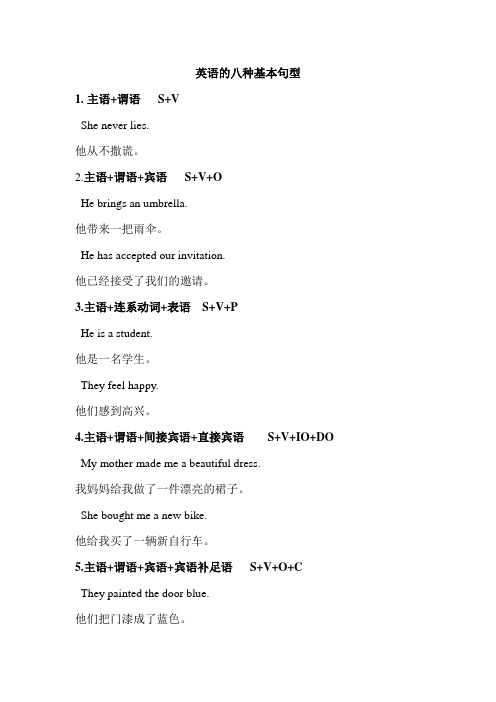
英语的八种基本句型1.主语+谓语S+VShe never lies.他从不撒谎。
2.主语+谓语+宾语S+V+OHe brings an umbrella.他带来一把雨伞。
He has accepted our invitation.他已经接受了我们的邀请。
3.主语+连系动词+表语S+V+PHe is a student.他是一名学生。
They feel happy.他们感到高兴。
4.主语+谓语+间接宾语+直接宾语S+V+IO+DO My mother made me a beautiful dress.我妈妈给我做了一件漂亮的裙子。
She bought me a new bike.他给我买了一辆新自行车。
5.主语+谓语+宾语+宾语补足语S+V+O+C They painted the door blue.他们把门漆成了蓝色。
I find him a reliable man.我发现他是一个可信赖的人。
We saw him swimming in the river.我看见他正在河里游泳。
6.主语+谓语+状语S+V+AHe talked too much.他说的太多了。
Jim runs in the park.吉姆在公园里跑步。
7.主语+谓语+宾语+状语S+V+O+A He put the coffee on the table.他把咖啡放在桌上了。
I listened to her story carefully.我认真听了他的故事。
8.存在句( there be)There is a restaurant around the corner. 拐角处有一家餐馆。
There are two people waiting outside. 有两个人正在外面等候。
练习题: 判断下列句子的句式结构。
1. All of us laughed!2. I miss my grandma.3. Mr Zhou is a kind and humorous teacher.4. He told us a funny story.5. We must act.6. I had my first math class in senior high school.7. The math homework looks easy.8. I found most of my classmates friendly and helpful.9. My mom bought me a new dictionary.10. We had a chemistry in the newly built lab.答案:1.主+谓2.主+谓+宾3.主+系+表4.主谓+间接宾语+直接宾语5.主+谓6.主+谓+宾+状7.主+系+表8.主+谓+宾+宾补9.主+谓+间接宾语+直接宾语10.主+谓+宾+状。
英语5大句子类型

英语5大句子类型
英语五大基本句型:
1、主语+谓语的句型
例如:they are my friends.(他们是我的好朋友。
)
we must keep our school clean.(我们必须保持我们的`学校清洁。
)
2、主语+谓语+宾语
例如:she plans to travel in the coming May Day.(她打算在即将到来的“五一”外出旅游。
)
I like watching TV very much.(我非常喜欢看电视。
)
3、主语+谓语+双宾语(直接宾语+间接宾语)
例如:I tell him a story.(我给他了个故事。
)
mum gave an apple to me.(妈妈给了我一个苹果。
)
4、主语+谓语+宾语+宾语补足语
例如:they made the boy work 16 hours a day.(他们让这个男孩每天工作16个小时。
)
the lion ordered the hen to give him some eggs.(狮子命令母鸡给他一些鸡蛋。
)
5、主语+系动词+表语。
及物动词本身需要一个宾语外,还需要一个名词、形容词、副词、动词不定式、分词来补充说明宾语,才能表达一个完整的意念。
例如:the house looks dirty.(这个房间看起来很脏。
)
his mother is a doctor.(他的妈妈是一个老师。
)。
英语五种基本句型
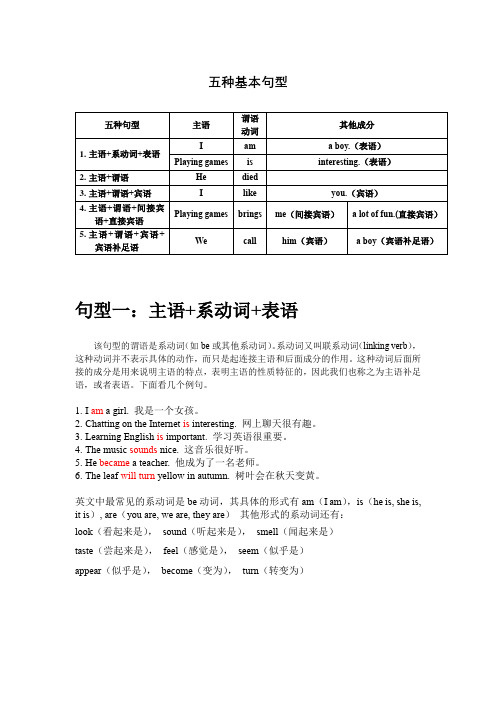
五种基本句型句型一:主语+系动词+表语该句型的谓语是系动词(如be或其他系动词)。
系动词又叫联系动词(linking verb),这种动词并不表示具体的动作,而只是起连接主语和后面成分的作用。
这种动词后面所接的成分是用来说明主语的特点,表明主语的性质特征的,因此我们也称之为主语补足语,或者表语。
下面看几个例句。
1.I am a girl. 我是一个女孩。
2.Chatting on the Internet is interesting. 网上聊天很有趣。
3.Learning English is important. 学习英语很重要。
4.The music sounds nice. 这音乐很好听。
5.He became a teacher. 他成为了一名老师。
6.The leaf will turn yellow in autumn. 树叶会在秋天变黄。
英文中最常见的系动词是be动词,其具体的形式有am(I am),is(he is, she is, it is), are(you are, we are, they are)其他形式的系动词还有:look(看起来是),sound(听起来是),smell(闻起来是)taste(尝起来是),feel(感觉是),seem(似乎是)appear(似乎是),become(变为),turn(转变为)句型二:主语+谓语该句型的谓语动词是不及物动词(intransitive verb),所表示的动作没有作用对象,其本身的意思完整,所以其后不需要带宾语。
下面看几个例子:1.He died. 他死了。
(解析:死(die)这个动作就是主语自主的完成的,并没有作用对象,所以die 这个不及物动词后不能再接宾语了。
)2.These children are playing. 这些孩子们正在玩耍。
(解析:该句的play本身已经表达了完整的意思,没有作用的对象,这句话并不需要告诉我们孩子们在玩什么。
84个英语基本句型

英语是一门广泛使用的语言,掌握基本句型可以帮助我们有效地表达自己的意思。
下面将介绍84个常用的英语基本句型,希望对大家学习英语有所帮助。
1. 主语 + 动词:I eat.2. 主语 + 动词 + 宾语:She reads books.3. 主语 + 不及物动词:They swim.4. 主语 + 系动词 + 表语:He is happy.5. 主语 + 动词 + 间接宾语 + 直接宾语:She gave me a gift.6. 主语 + 动词 + 宾语 + 宾语补足语:We consider him our friend.7. 主语 + 动词 + 间接宾语 + 直接宾语 + 宾语补足语:They made him their leader.8. 主语 + 动词 + 宾语 + 宾语补足语:He painted the wall red.9. 主语 + 动词 + 宾语 + 间接宾语:She told me a joke.10. 主语 + 不及物动词 + 表语:He became a doctor.11. 主语 + 不及物动词 + 宾语补足语:They elected him president.12. 主语 + 不及物动词 + 宾语 + 宾语补足语:She made him her assistant.13. 主语 + 系动词 + 宾语 + 宾语补足语:I find English interesting.14. 主语 + 系动词 + 表语 + 宾语:She called me a fool.15. 主语 + 系动词 + 宾语 + 宾语补足语:He made me his secretary.16. 主语 + 系动词 + 宾语 + 表语:They named the baby Adam.17. 主语 + 状语 + 动词:We ran quickly.18. 主语 + 状语 + 系动词 + 表语:He felt really tired.19. 主语 + 动词 + 状语:She sings beautifully.20. 主语 + 宾语 + 状语 + 动词:He won the game with great effort.21. 主语 + 宾语 + 状语 + 动词 + 宾语补足语:They elected her president with unanimous support.22. 主语 + 谓语 + 宾语 + 状语:We found the key under the bed.23. 主语 + 谓语 + 宾语 + 状语 + 宾语补足语:She named her daughter Lily out of love for flowers.24. 主语 + 谓语 + 不定式:They want to play.25. 主语 + 谓语 + 动词 + 不定式:He can swim.26. 主语 + 谓语 + 宾语 + 动词 + 不定式:She asked me to help.27. 主语 + 谓语 + 不定式 + 宾语补足语:We believe him to be honest.28. 主语 + 谓语 + 宾语 + 不定式 + 宾语补足语:He wants me to be his assistant.29. 主语 + 谓语 + 不定式 + 状语:You need to study hard.30. 主语 + 谓语 + 动名词:She enjoys swimming.31. 主语 + 谓语 + 宾语 + 动名词:They appreciate her singing.32. 主语 + 谓语 + 动名词 + 宾语补足语:I consider cooking an art.33. 主语 + 谓语 + 不定式 + 动名词:He started to learn painting.34. 主语 + 谓语 + 宾语 + 不定式 + 动名词:She saw him come in.35. 主语 + 谓语 + 宾语 + 不定式 + 状语:We made them stay longer.36. 主语 + 谓语 + 不定式 + 宾语补足语 + 动名词:He wants us to help him finish the project.37. 主语 + 谓语 + 不定式 + 宾语补足语 + 状语:I expect you to arrive on time.38. 主语 + 谓语 + 不定式 + 动名词 + 状语:They will try to solve the problem by working together.39. 主语 + 谓语 + 宾语 + 不定式 + 宾语补足语 + 状语:She persuaded him to stay after school for extra practice.40. 主语 + 谓语 + 分词:He looked tired.41. 主语 + 谓语 + 宾语 + 分词:They found the book interesting.42. 主语 + 谓语 + 分词 + 宾语补足语:We consider him qualified for the job.43. 主语 + 谓语 + 不定式 + 分词:She decided to leave quickly.44. 主语 + 谓语 + 宾语 + 不定式 + 分词:He heard her sing beautifully.45. 主语 + 谓语 + 分词 + 状语:They sat there, waiting for the bus.46. 主语 + 谓语 + 宾语 + 分词 + 状语:We saw her boarding the train.47. 主语 + 谓语 + 分词 + 宾语补足语 + 状语:He walked away, satisfied with his achievement.48. 主语 + 谓语 + 分词 + 不定式:She came running to me to ask a question.49. 主语 + 谓语 + 宾语 + 分词 + 不定式:They saw him standing alone in the rain.50. 主语 + 谓语 + 分词 + 宾语 + 不定式:We watched the movie, hoping to be entertained.51. 主语 + 谓语 + 不定式 + 分词 + 宾语补足语:He wants us to stay focused on our goals.52. 主语 + 谓语 + 不定式 + 分词 + 状语:She needs to finish her homework before going out.53. 主语 + 谓语 + 宾语 + 不定式 + 分词 + 状语:They made him work extra hours to meet the deadline.54. 主语 + 谓语 + 不定式 + 分词 + 宾语补足语:We believe you to have the ability to succeed.55. 主语 + 谓语 + 不定式 + 分词 + 宾语补足语 + 状语:He considered it a great honor to be chosen as the team captain.56. 主语 + 谓语 + 分词 + 状语 + 宾语:They finished the task, exhausted.57. 主语 + 谓语 + 宾语 + 分词 + 状语 + 宾语补足语:She found him standing there, helpless.58. 主语 + 谓语 + 分词 + 宾语 + 状语:He left the room, closing the door behind him.59. 主语 + 谓语 + 分词 + 宾语 + 宾语补足语:We saw her painting the wall red.60. 主语 + 谓语 + 宾语 + 分词 + 宾语补足语 + 状语:They heard him singing in the shower, beautifully.61. 主语 + 谓语 + 分词 + 不定式 + 状语:She stood there, not knowing what to say.62. 主语 + 谓语 + 宾语 + 分词 + 不定式 + 状语:He caught her reading his diary, secretly.63. 主语 + 谓语 + 分词 + 宾语 + 不定式 + 状语:They watched the kids playing happily in the park.64. 主语 + 谓语 + 不定式 + 分词 + 状语 + 宾语补足语:We want you to come prepared for the meeting.65. 主语 + 谓语 + 不定式 + 分词 + 宾语 + 状语:She asked me to stay quiet, not attracting attention.66. 主语 + 谓语 + 分词 + 状语 + 宾语 + 宾语补足语:They arrived at the party late, all dressed up.67. 主语 + 谓语 + 分词 + 宾语 + 状语 + 宾语补足语:I left the office, feeling satisfied with my performance.68. 主语 + 谓语 + 分词 + 宾语 + 宾语补足语 + 状语:He walked away, looking disappointed.69. 主语 + 谓语 + 不定式 + 宾语 + 分词:She wants us to keep the door closed, protecting the animals inside.70. 主语 + 谓语 + 不定式 + 状语 + 分词:They need to finish the project, no matter how hard it is.71. 主语 + 谓语 + 不定式 + 宾语 + 分词 + 状语:We would like you to come over for dinner, if you are available.72. 主语 + 谓语 + 不定式 + 分词 + 状语 + 宾语补足语:He decided to work harder, hoping to achieve better results.73. 主语 + 谓语 + 不定式 + 分词 + 宾语补足语 + 状语:She wanted him to leave, regardless of his apology.74. 主语 + 谓语 + 分词 + 宾语 + 不定式:They saw him running down the street to catch the bus.75. 主语 + 谓语 + 分词 + 不定式 + 宾语:He felt someone touch his shoulder, turning around to see who it was.76. 主语 + 谓语 + 分词 + 宾语 + 不定式 + 宾语补足语:She caught her sister eating her chocolate cake, scolding her for the theft.77. 主语 + 谓语 + 不定式 + 分词 + 宾语 + 状语:They asked me to speak louder, not being able to hear me clearly.78. 主语 + 谓语 + 不定式 + 分词 + 状语 + 宾语补足语:We advised him to approach the problem from a different angle, with the hope of finding a solution.79. 主语 + 谓语 + 不定式 + 宾语 + 分词 + 宾语补足语 + 状语:She reminded him to take his medicine, not forgetting his doctor's advice.80. 主语 + 谓语 + 不定式 + 分词 + 宾语 + 状语 + 宾语补足语:He urged them to apply for the position, fully aware of their qualifications. 81. 主语 + 谓语 + 分词 + 不定式 + 状语 + 宾语 + 宾语补足语:They watched the news report excitedly, hoping to see their favorite celebrity mentioned.82. 主语 + 谓语 + 分词 + 不定式 + 宾语 + 宾语补足语 + 状语:She left the room angrily, slamming the door shut.83. 主语 + 谓语 + 不定式 + 分词 + 状语 + 宾语 + 宾语补足语:We told him to study hard, not wasting his potential.84. 主语 + 谓语 + 不定式 + 分词 + 宾语 + 状语 + 宾语补足语:He encouraged her to believe in herself, never doubting her abilities.这些基本句型涵盖了常见的英语句子结构,掌握它们可以帮助你更好地表达自己的思想和意图。
英语的七大基本句型
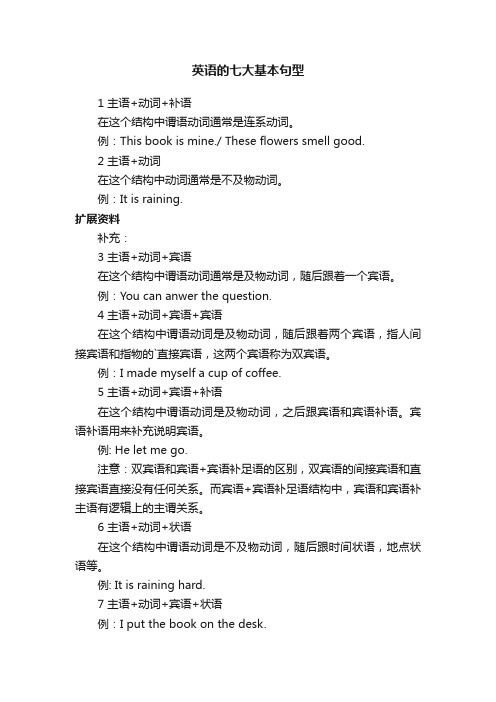
英语的七大基本句型
1 主语+动词+补语
在这个结构中谓语动词通常是连系动词。
例:This book is mine./ These flowers smell good.
2 主语+动词
在这个结构中动词通常是不及物动词。
例:It is raining.
扩展资料
补充:
3 主语+动词+宾语
在这个结构中谓语动词通常是及物动词,随后跟着一个宾语。
例:You can anwer the question.
4 主语+动词+宾语+宾语
在这个结构中谓语动词是及物动词,随后跟着两个宾语,指人间接宾语和指物的`直接宾语,这两个宾语称为双宾语。
例:I made myself a cup of coffee.
5 主语+动词+宾语+补语
在这个结构中谓语动词是及物动词,之后跟宾语和宾语补语。
宾语补语用来补充说明宾语。
例: He let me go.
注意:双宾语和宾语+宾语补足语的区别,双宾语的间接宾语和直接宾语直接没有任何关系。
而宾语+宾语补足语结构中,宾语和宾语补主语有逻辑上的主谓关系。
6 主语+动词+状语
在这个结构中谓语动词是不及物动词,随后跟时间状语,地点状语等。
例: It is raining hard.
7 主语+动词+宾语+状语
例:I put the book on the desk.。
英语基本句型8种
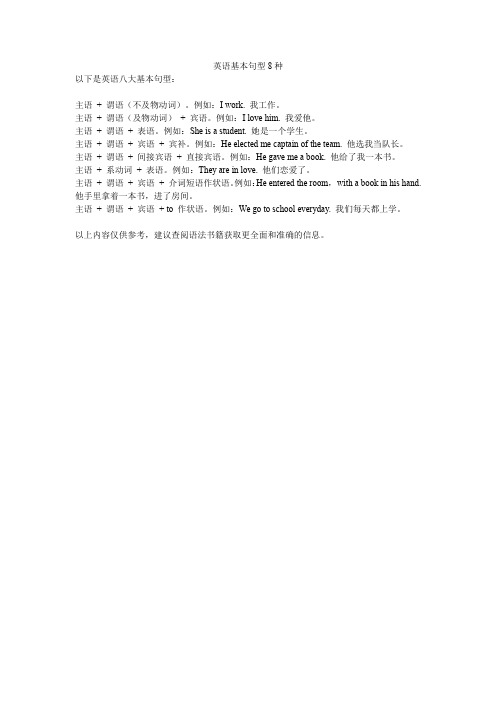
英语基本句型8种
以下是英语八大基本句型:
主语+ 谓语(不及物动词)。
例如:I work. 我工作。
主语+ 谓语(及物动词)+ 宾语。
例如:I love him. 我爱他。
主语+ 谓语+ 表语。
例如:She is a student. 她是一个学生。
主语+ 谓语+ 宾语+ 宾补。
例如:He elected me captain of the team. 他选我当队长。
主语+ 谓语+ 间接宾语+ 直接宾语。
例如:He gave me a book. 他给了我一本书。
主语+ 系动词+ 表语。
例如:They are in love. 他们恋爱了。
主语+ 谓语+ 宾语+ 介词短语作状语。
例如:He entered the room,with a book in his hand. 他手里拿着一本书,进了房间。
主语+ 谓语+ 宾语+ to 作状语。
例如:We go to school everyday. 我们每天都上学。
以上内容仅供参考,建议查阅语法书籍获取更全面和准确的信息。
英语的五种基本句型
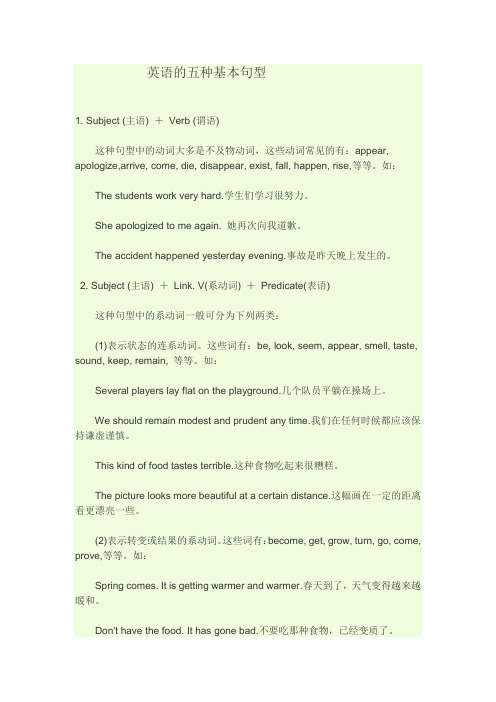
英语的五种基本句型1. Subject (主语) +Verb (谓语)这种句型中的动词大多是不及物动词,这些动词常见的有:appear, apologize,arrive, come, die, disappear, exist, fall, happen, rise,等等。
如:The students work very hard.学生们学习很努力。
She apologized to me again. 她再次向我道歉。
The accident happened yesterday evening.事故是昨天晚上发生的。
2. Subject (主语) +Link. V(系动词) +Predicate(表语)这种句型中的系动词一般可分为下列两类:(1)表示状态的连系动词。
这些词有:be, look, seem, appear, smell, taste, sound, keep, remain, 等等。
如:Several players lay flat on the playground.几个队员平躺在操场上。
We should remain modest and prudent any time.我们在任何时候都应该保持谦虚谨慎。
This kind of food tastes terrible.这种食物吃起来很糟糕。
The picture looks more beautiful at a certain distance.这幅画在一定的距离看更漂亮一些。
(2)表示转变或结果的系动词。
这些词有:become, get, grow, turn, go, come, prove,等等。
如:Spring comes. It is getting warmer and warmer.春天到了,天气变得越来越暖和。
Don't have the food. It has gone bad.不要吃那种食物,已经变质了。
英语十大基本句型
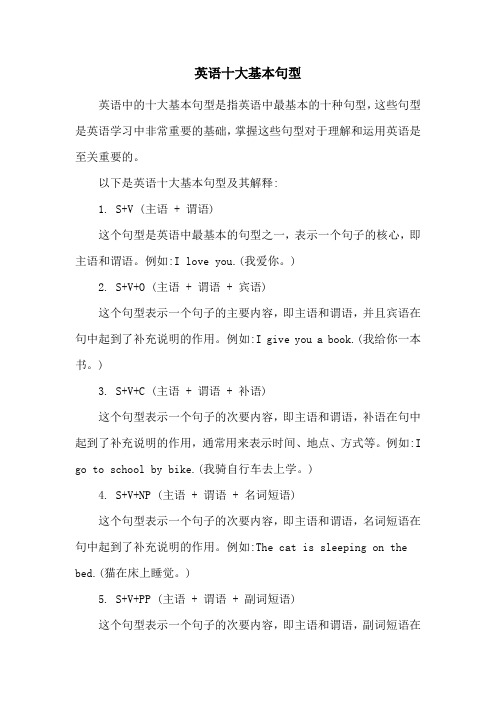
英语十大基本句型英语中的十大基本句型是指英语中最基本的十种句型,这些句型是英语学习中非常重要的基础,掌握这些句型对于理解和运用英语是至关重要的。
以下是英语十大基本句型及其解释:1. S+V (主语 + 谓语)这个句型是英语中最基本的句型之一,表示一个句子的核心,即主语和谓语。
例如:I love you.(我爱你。
)2. S+V+O (主语 + 谓语 + 宾语)这个句型表示一个句子的主要内容,即主语和谓语,并且宾语在句中起到了补充说明的作用。
例如:I give you a book.(我给你一本书。
)3. S+V+C (主语 + 谓语 + 补语)这个句型表示一个句子的次要内容,即主语和谓语,补语在句中起到了补充说明的作用,通常用来表示时间、地点、方式等。
例如:I go to school by bike.(我骑自行车去上学。
)4. S+V+NP (主语 + 谓语 + 名词短语)这个句型表示一个句子的次要内容,即主语和谓语,名词短语在句中起到了补充说明的作用。
例如:The cat is sleeping on the bed.(猫在床上睡觉。
)5. S+V+PP (主语 + 谓语 + 副词短语)这个句型表示一个句子的次要内容,即主语和谓语,副词短语在句中起到了补充说明的作用。
例如:The sun is shining brightly.(太阳正在明媚地照耀。
)6. S+V+OC (主语 + 谓语 + 宾语 + 补语)这个句型表示一个句子的主要内容,即主语和谓语,宾语和补语在句中起到了补充说明的作用。
例如:I see a cat jumping over the fence.(我看见一只猫跃过篱笆。
)7. S+V+CC (主语 + 谓语 + 补语 + 宾语)这个句型表示一个句子的主要内容,即主语和谓语,宾语在句中起到了补充说明的作用,而补语则起到了强调的作用。
例如:I love you, that"s all.(我爱你,就这些。
- 1、下载文档前请自行甄别文档内容的完整性,平台不提供额外的编辑、内容补充、找答案等附加服务。
- 2、"仅部分预览"的文档,不可在线预览部分如存在完整性等问题,可反馈申请退款(可完整预览的文档不适用该条件!)。
- 3、如文档侵犯您的权益,请联系客服反馈,我们会尽快为您处理(人工客服工作时间:9:00-18:30)。
5.主----动----宾---补 SVOC结构也叫 做复合宾语结构
• We made him our spokesman. • They elected him president. • The directors appointed him sale manager. • He pronounced himself in favor of the plan. • They painted the walls creamy white.
英语基本句型
基本句型是分句结构的几种基本格局, 也就是千变万化的句子的结构雏形,现 代英语的基本句型主要有五+二(附加 形式),即七种
1.主-------动-------补 SVC结构 谓 语动词通常为联系动词
• That car is Linda’s. • She is in good health. • These violets smell fragrant. • All the tourists seemed pleased.
• I want a return ticket. • Nobody could answer the question. • The train is building up speed.
4.主----动----宾----宾 SVOO)结构 此动词为双宾及物动词
• I sent him a telegram. • Mary lent me her car. • The old woman showed me the way. • I made myself a cup of tea. • Please give me a book. • Please give a book to me. • Someone left you this note.
17th century.
7.主---谓---宾---状 SVOA结构
• I put the material evidence in front of him. • He treated her vilely.
Байду номын сангаас
2.主-------动 Intransitive verb SV 结构 V为不及物动词
• Iron rusts.. • Everybody laughed. • Prices are going down. • The guests have arrived.
3.主------动-------宾 SVO结构 V 为及物动词
6.主----谓---状 SVA结构
• I live in Beijing. • They stayed in a hotel. • The train leaves at six. • He will be flying to shanghai. • Shakespeare lived in the 16th and early
